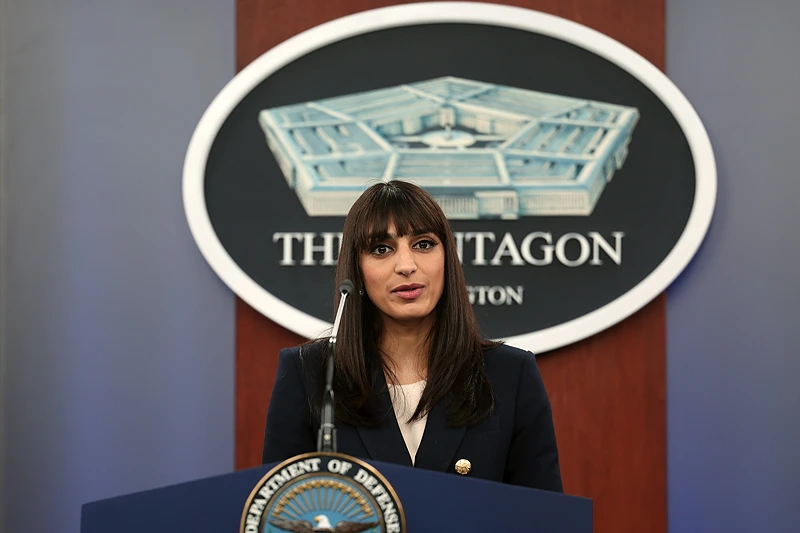
OAN Brooke Mallory
UPDATED 1:25 PM – Friday, April 21, 2023
According to two of the top Artificial Intelligence (AI) consultants in U.S. Central Command, the U.S. military is embracing AI as a tool for quickly analyzing data and assisting leaders in making the best judgments, not to make those decisions for the humans in charge.
Dr. Andrew W. Moore has just been appointed as CENTCOM’s first AI advisor. CENTCOM is responsible for maintaining American national security in the Middle East and Southeast Asia. He is a former director of Google Cloud AI and a former dean of the School of Computer Science at Carnegie Mellon University. Andrew Moore will collaborate with Schuyler Moore, CENTCOM’s chief technology officer.
In a news conference, they both acknowledged that, despite some people’s fantasies of AI-powered weaponry, the U.S. military prefers to keep humans in positions of decision-making while utilizing AI to analyze vast amounts of data that support those making decisions.
“There’s huge amounts of concern, rightly so, about the consequences of autonomous weapons… One thing that I’ve been very well aware of in all my dealings with… the U.S. military: I’ve never once heard anyone from the U.S. military suggest that it would be a good idea to create autonomous weapons,” Andrew said.
According to Chief Technology Officer Schuyler Moore, the military views AI as a “light switch” that can direct users on the proper path, as well as an aid in breaking down complex data. The Pentagon, she emphasized, “must and will always have a human in the loop making a final decision.”
“Help us make a better decision, don’t make the decision for us,” she said.
Using AI to stop smuggled weapons from reaching Iran is one instance they brought up in the context of CENTCOM. According to Ms. Moore, officials think AI could be used to assist the military in reducing the quantity of potentially suspect shipments by identifying those that deviate from “normal” shipping patterns and flagging them. AI may also be used to quickly analyze images and videos or offer interpretations to human military officials.
“You can imagine thousands and thousands of hours of video feed or images that are being captured from an unmanned surface vessel that would normally take an analyst hours and hours and hours to go through… And when you apply computer vision algorithms, suddenly you can drop that time down to 45 minutes,” said Ms. Moore.
According to Andrew Moore, in order to get this kind of system up and running, a massive amount of data must be processed by an AI system so that it can recognize typical shipping patterns.
“There’s two big things going on when it comes to data, computing and networks within the combatant commands such as CENTCOM,” he said. “The first one is getting hold of data. And the next one is, having computers which can understand and draw conclusions from that data.”
The goal, according to Ms. Moore, is to develop AI to the point where it comprehends the “patterns of life” in that region of the world so that the U.S. can recognize when those patterns are disrupted in ways that would endanger U.S. national security. She used the example of monitoring shipping surrounding Iran and described the initiative as a “crawl, walk, run” campaign that will improve the clarity and speed of U.S. military choices.
“The crawl is, do I see anything at all? Do I have a sensor that can take a picture?” she said. “The walk is, can I tell what is in the picture? And then the run is, do I understand the context of what is in the picture? Do I know where it came from, do I know where it’s going and do I know if that’s normal.”
Similar attempts will most likely be made in sectors like air traffic, allowing the U.S. to interpret dangerous patterns in the sky more quickly than humans could distinguish between “normal” and abnormal traffic.
Andrew Moore stated that one of his responsibilities is to assist CENTCOM in integrating these AI capabilities into the military. Some commercial products, he claimed, are capable of forecasting things like how much merchandise should be sent to a specific retailer.
“The technology got very good at spotting and predicting, even very minor fluctuations,” he said. “The thing that I hope to be able to do in this role… is to see if I can help make sure that some of these very clever methods being used in the commercial sector, we can also apply them to help with some of these big public facing issues in the military sector.”
He added that he believes the United States is competing with its rivals to produce an AI system that is more responsible and advanced. Moore said that some nations are becoming “scarily good” at utilizing AI to carry out unauthorized spying.
“We have to be ready to counter these kinds of aggressive surveillance techniques against the United States,” he maintained.
Stay informed! Receive breaking news blasts directly to your inbox for free. Subscribe here. https://www.oann.com/alerts

